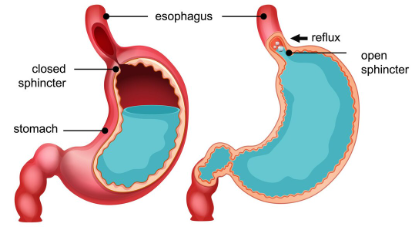Foods to Help With GERD
- Updated on: Nov 23, 2024
- 5 min Read
- Published on Nov 26, 2020

Gastroesophageal reflux disease (GERD) is characterized by the backflow of acidic contents from the stomach into the esophagus. This condition is often characterized by heartburn symptoms, pain in the middle of the chest, nausea, vomiting, burping, and bad breath. GERD symptoms can be reduced to a larger extent by maintaining a healthy lifestyle and dietary habits. Diet plays an essential role in avoiding the symptoms of GERD.
How and Which Foods Help in Reducing the Symptoms of GERD?
Food plays an essential role in the development and prevention of GERD symptoms. GERD occurs if you consume a food that is hyper acidic (Containing a large amount of acid). Hyper acidic foods increase the amount of acid in the stomach, which causes the relaxation of the LES valve. As a result, the stomach acid backflows into the esophagus leading to GERD symptoms. Certain foods are less acidic and provide relief from the GERD symptoms like indigestion, heartburn, chest pain, etc. Such foods cannot cure the condition but provide relief to patients from frequent GERD episodes. Following are some of the foods that have been found to be useful in GERD:
Fruits
Some low acid and non-citrus fruits like apple, banana, watermelon, muskmelon, and pears help your GERD treatment diet plan. These fruits prevent symptoms like heartburn, chest pain, and indigestion. Besides, they also keep your digestive system healthy.
Ginger
Ginger has natural anti-inflammatory properties that have a soothing effect on your GERD symptoms. It prevents the irritation of the esophagus caused due to acid reflux. This, in turn, reduces heartburn and other gastrointestinal problems. Ginger also plays a role in reducing the secretion of stomach acids. It is recommended to consume ginger in the form of a caffeine-free ginger tea along with honey as a sweetener. You can also enjoy some ginger root smoothies to get rid of your GERD symptoms.
Oatmeal
Oatmeal is a very healthy food and can be the best meal to start the day. It is rich in fiber content and therefore prevents acid production in the stomach, which in turn reduces the chances of acid reflux.
Brown Rice
Brown rice is a fiber-rich food, which can help in managing the digestive system. It is a vitamin-B rich food. It can also help reduce acid reflux symptoms because it helps in absorbing excess stomach acid.
Vegetables
Since vegetables are low in fat and sugar, they are very useful in preventing acid production within the stomach. Some of the vegetables that can be helpful are green beans, asparagus, leafy greens, broccoli, asparagus, potatoes, celery, cauliflower, lettuce, and cucumbers. Consuming these vegetables in your food can prevent the symptoms of GERD.
Egg Whites
Egg whites consist of low acid content and are a rich source of protein. Egg white can be useful for preventing GERD symptoms and because they prevent acid reflux.
Chicken Breast
Chicken breast without skin (contains fat) has been found to be helpful against acid reflux and the associated GERD symptoms.
Olive oil
Virgin olive oil can be good for reducing the increased amounts of acid in the stomach. It is low acidity oil, and its acidity ranges between 0.2% to 0.8%. Due to its low acidic nature, it prevents GERD symptoms.
Fennel
Fennel seeds (saunf) have a mild licorice flavor. It has a low acidic content, which helps in preventing GERD symptoms. If you don’t want to eat it directly, you can roast it. You can soak fennel seeds in water and drink that water for reducing the heart burning sensation due to acid and contractions.
Honey
Honey is viscous in nature and forms a mucus layer within the esophagus. This layer acts as a protective barrier and protects the esophageal lining against the damage caused by the acid coming out from the stomach due to reflux. Honey can also cure the damage and inflammation of the esophagus by removing the free radicals.
Aloe-Vera Juice
Aloe vera has alkaline nature and works effectively against heartburn. You can drink a cup of aloe vera juice before your meal to reduce the risk of acid reflux. It neutralizes the acidic contents within the stomach. It also soothes inflammation and irritation in the esophagus caused by the acid.
Skimmed Milk
Milk is a rich source of calcium, and calcium is an important component of many antacids because it reduces the level of acid in the stomach. High-fat milk should be avoided as it may increase the acid within the stomach. On the other hand, skimmed milk can be a good option as it buffers the stomach acid and provides relief from the irritation and burning sensation caused by increased acid content in the stomach.
Yogurt
Yogurt containing probiotics can be beneficial for digestive health. It provides a soothing effect against the irritation and burning sensation caused due to GERD. Yogurt can be a good option for people who can’t consume skimmed milk due to lactose intolerance (inability to digest lactose).
Lemon Water
Although lemon is a citrus fruit and contains citric acid that can worsen GERD, mixing a small amount of lemon with warm water makes it alkaline. This alkaline lemon water can help neutralize stomach acid.
Sweets and Deserts
If you have an acid reflux problem, you can prefer sweets such as yogurt cookies, low-fat cakes, gelatin-based desserts, and ice milk. All these sweet dishes and good to eat in acidity.
Read About Posture Effects on Your GERD Symptoms
Which Foods Should Be Avoided in GERD?
Some foods should be avoided in GERD because they increase the acid secretion in the stomach. Increased acid secretion may lead to acid reflux and ultimately results in GERD. Following are some of the foods that should be avoided during GERD:
- Full fat milk
- Chocolate
- Carbonated beverages
- Caffeinated drinks such as tea and coffee
- Citrus fruits such as lemon, citrus, and tomato
- Garlic
- Onion
- Peppermint
- Spicy food
- Oily and greasy food
- Different types of sauces such as chili sauce, soya sauce,and pizza sauce
- Fried foods such as fried rice, french fries, and fried chicken
You can also make some of the following lifestyle changes along with certain diet modifications to reduce the risk of GERD:
- Avoid taking big meals
- Take your food 3 hours before bed
- Lose your weight if you are obese
- Shift your sleeping position on the left side
- Avoid alcohol and smoking
- Do some relaxation exercises like yoga and mediation
FAQs
What Are the Best Foods to Eat If You Have GERD?
The best foods which can relieve the irritation and heartburn symptoms of GERD are:
- Non-citrus fruits like apple, banana and pear.
- Vegetables like broccoli, cauliflower, lettuce,cucumber,and potatoes
- Oatmeal, bread and brown rice
- Aloe vera juice
Is Yogurt Good for GERD?
Yoghurt can be a good choice for GERD, because it gives a soothing effect on your stomach and prevents it from irritation. It may also be taken as alternative for skimmed milk because some people have lactose intolerance and they cannot digest milk because of increased acidity in stomach leading to appearance of GERD symptoms.
Is Honey Good for Acid Reflux?
Honey can be a good food for acid reflux. It helps in reducing inflammation of the esophagus which occurs due to acid reflux. Honey provides a mucus coating to the esophagus to protect it from acid secretion.
What is a Good Breakfast for Acid Reflux?
Oatmeal and whole grain breads can be good breakfast for acid reflux because they are fiber rich foods. The fiber rich diet can reduce the risk of acid reflux. You can also add yoghurt and skimmed milk in your breakfast. These help in reducing the symptoms of acid reflux.












